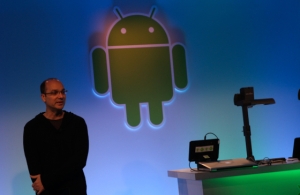Google's Rubin reasserts Android openness

Android boss Andy Rubin has struck back at suggestions that Google's open-source mobile platform is not as open as it once was.

Android boss Andy Rubin has said Google is "committed to fostering the development of an open platform for the mobile industry". Photo credit: James Martin/CNET News
In a blog post entitled "I think I'm having a Gene Amdahl moment" — ex-IBM worker Amdahl coined the term 'fear, uncertainty and doubt' (FUD) in the mid-1970s, referring to his former employer's alleged disinformation tactics — Rubin said on Wednesday that there had recently been "a lot of misinformation in the press about Android and Google's role in supporting the ecosystem".
"I'm writing in the spirit of transparency and in an attempt to set the record straight," Rubin wrote. "The Android community has grown tremendously since the launch of the first Android device in October 2008, but throughout we've remained committed to fostering the development of an open platform for the mobile industry and beyond."
Rubin's blog post comes a week after a widely-disseminated Businessweek article in which unnamed executives said Google had now begun demanding that any company seeking early access to new Android code would have to seek Rubin's approval first. The publication said the source code for Android 3.0, the tablet-optimised OS version also known as Honeycomb, would not be widely released. It also quoted its sources as saying Google was demanding that Android licensees sign up to a non-fragmentation clause, giving Google a veto on changes made to the OS's interface and services.
"We don't believe in a 'one size fits all' solution," Rubin said of the platform, which as open source is free for use and alteration by anyone. "We are seeing the platform take on new use cases, features and form factors as it's being introduced in new categories and regions while still remaining consistent and compatible for third-party applications."
Anti-fragmentation requirements
Rubin said that, "as always", device manufacturers were free to customise "any range" of Android's features as they wish. However, he said, "if someone wishes to market a device as Android-compatible or include Google applications on the device, we do require the device to conform with some basic compatibility requirements", so as to make sure applications run decently on all such devices.
This anti-fragmentation requirement, Rubin pointed out, has been around since Android 1.0. "In fact, all of the founding members of the Open Handset Alliance agreed not to fragment Android when we first announced it in 2007," he wrote. "Our approach remains unchanged: there are no lock-downs or restrictions against customising UIs."
The Honeycomb code will come out once the Android team has made it fully compatible with smartphones as well as tablets, Rubin said, adding: "This temporary delay does not represent a change in strategy."
Get the latest technology news and analysis, blogs and reviews delivered directly to your inbox with ZDNet UK's newsletters.